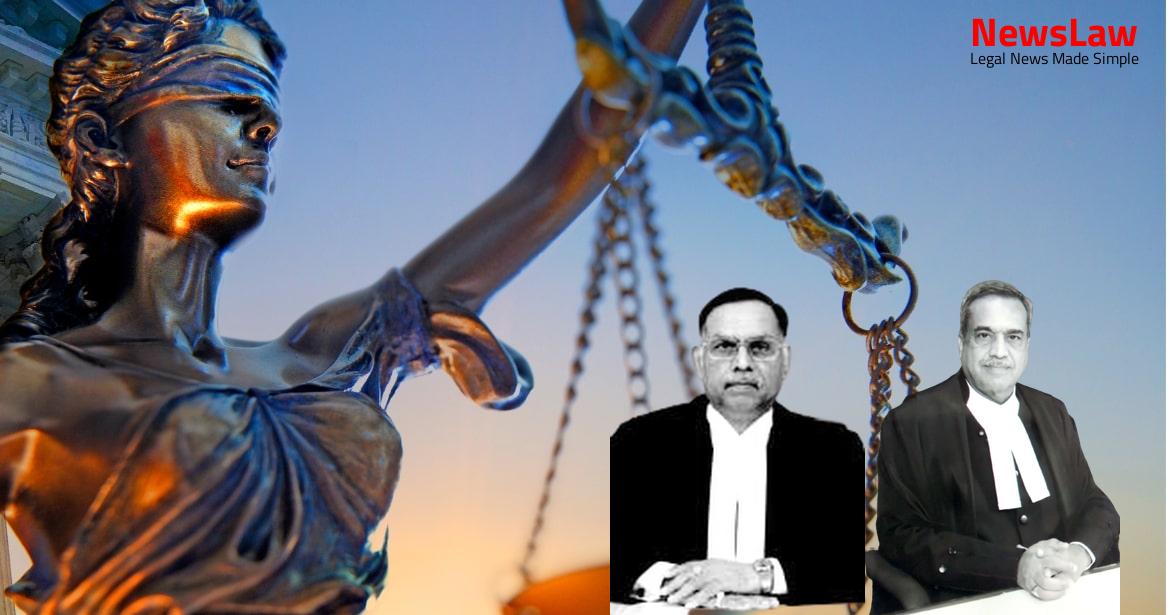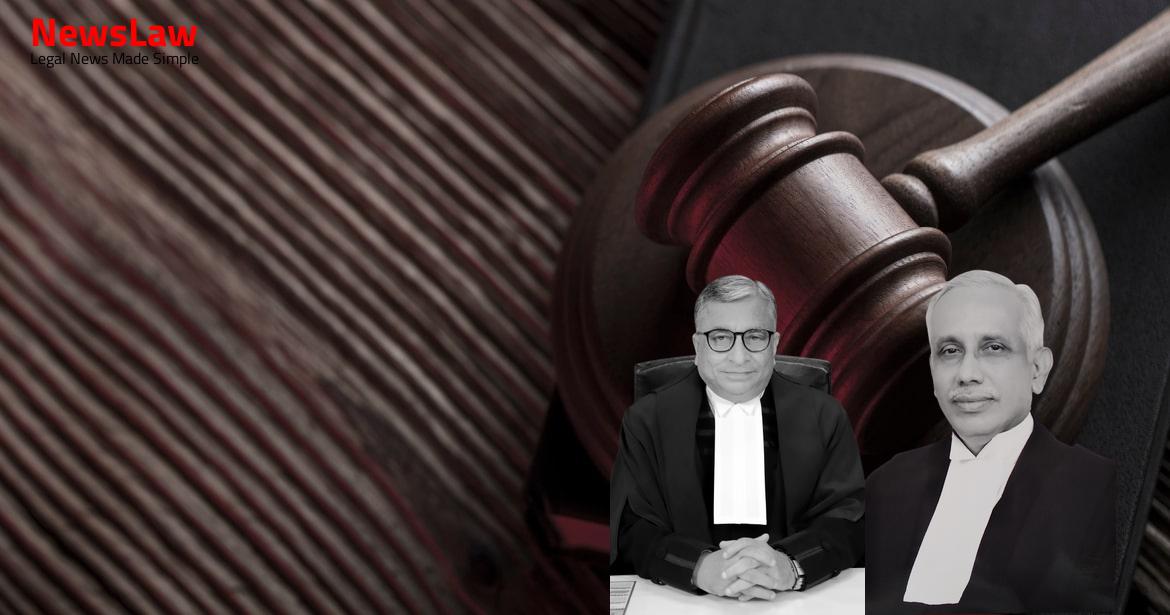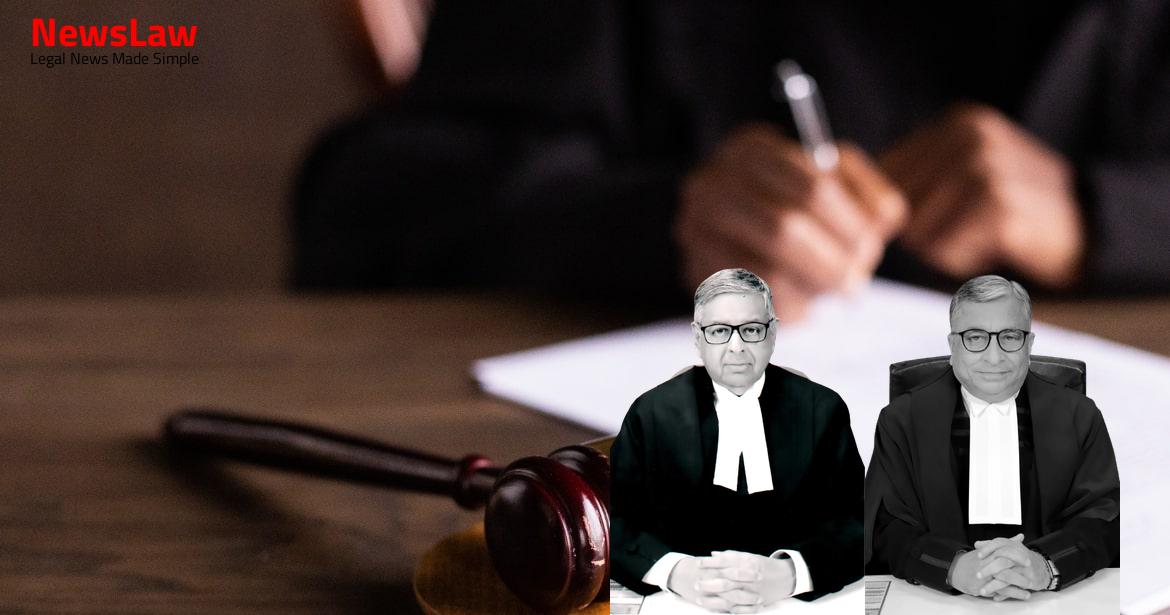Delve into the nuanced legal analysis of dying declarations in criminal cases, focusing on the interpretation and relevance of Section 32(1) of the Indian Evidence Act. This summary highlights the court’s meticulous examination of witness statements and the application of legal principles to determine probative value. Stay tuned to unravel the complexities of legal proceedings in the pursuit of justice.
Facts
- The Sessions Court convicted the respondent for offences punishable under Sections 302, 376, 341 and 448 of the IPC and sentenced him to life imprisonment.
- Dr. Minu Mukherjee’s testimony did not conclusively prove whether the respondent raped the deceased.
- Hostile witnesses may have been influenced not to testify against the accused through bribes or threats.
- There is no bar for a police officer to record a dying declaration.
- A typographical error regarding the certification of the deceased’s mental and physical fitness was clarified.
- Dr. RK Pandey’s testimony that the deceased was in agony does not negate her ability to make a statement.
- The appellant challenged the High Court’s decision under Article 136 of the Constitution.
- The Sessions Court’s conviction was based on evidence and the application of the law.
- The defence’s assertions regarding the dying declaration and hostile witnesses were rejected by the Sessions Court.
- The prosecution successfully proved its case beyond reasonable doubt, leading to the respondent’s conviction.
- The High Court later acquitted the respondent based on different considerations.
- Opinions of medical officers do not discredit witnesses of fact.
- The failure to analyze a seized bottle does not disprove the accused’s actions.
- Lallan Prasad, the IO, did not send the empty bottle seized from the crime scene to a laboratory as he was transferred soon after seizing it.
- Suresh Yadav took over the investigation from Lallan Prasad and submitted a supplementary charge-sheet under Section 302 of the IPC.
- Rekha Dasgupta, a nurse at Sadar Hospital, witnessed the seizure of the deceased’s undergarments by Lallan Prasad.
- A number of witnesses initially supporting the prosecution’s case turned hostile during the trial.
- Dr. R Mahto conducted the post-mortem examination on the deceased, determining the cause of death as septicemia due to burn injuries.
- Issues related to the testimonies and examinations conducted by the witnesses were raised during cross-examinations.
- The victim’s dying declaration was not recorded in the presence of one of the witnesses.
- The defence presented witnesses who contested the charges against the respondent.
- The Sessions Court received testimonies from various witnesses, including medical professionals and individuals present during the incident.
- Dr. Minu Mukherjee provided details on the victim’s medical examination and findings.
- The prosecution submitted a charge-sheet under Sections 307, 341, 376, and 448 of the IPC.
- Various findings related to the victim’s injuries and medical examination were presented during the trial.
Also Read: Balancing Power and Transparency: Electoral Bonds Struck Down, Disclosure Mandated
Issue
- Two questions for determination: relevance of deceased’s statement under Section 32(1) of the Indian Evidence Act 1872 and whether prosecution proved charges against respondent beyond reasonable doubt.
Also Read: Recall of Resolution Plan Approval: Legal Analysis
Arguments
- Dr. R. Mahto’s statement is relied upon to argue that the deceased was referred to Bokaro Burn Hospital but this advice was ignored.
- The defense sought to rely on Dr. R. Mahto’s testimony to establish that another doctor referred the deceased to Bokaro Burn Hospital, but this testimony is inadmissible under Section 60 of the Evidence Act.
- It was not proven that the deceased died due to her burn injuries since the unnamed referring doctor was not called as a witness.
- The post-mortem report concluded that the cause of death was septicemia due to the burn injuries.
- Opposing arguments were made by the respondent’s counsel, stating that the dying declaration did not definitively prove the rape and that the victim died a month after the incident, making the statement not a dying declaration.
- The defence has sought to question the credibility of the finding that an unnamed doctor referred the deceased to Bokaro Burn Hospital.
Analysis
- The deceased’s statement discloses that the respondent raped her before setting her on fire, leading to her death.
- Dr. R Mahto confirmed that the cause of death was septicemia due to burn injuries.
- The post-mortem report also concluded that the cause of death was septicemia from burn injuries.
- The statement of the deceased satisfies the conditions in Section 32(1) of the Evidence Act and is considered a relevant fact.
- The dying declaration holds greater probative value than the testimony of other witnesses.
- The lack of medical evidence of rape does not negate the dying declaration’s account of the crime.
- The dying declaration can be admitted without corroboration when not suspicious.
- The High Court’s overturning of the Sessions Court judgment was criticized, and the original judgment was reinstated.
- The dying declaration was deemed voluntary and true, indicating the guilt of the respondent.
- The sexual history of a woman is irrelevant for determining the ingredients of Section 375 of the IPC in a case.
- Witnesses may turn hostile for various reasons, including a desire to move on with their lives.
- The judgment must be shared with the Secretary of the Ministry of Health and Family Welfare, Government of India.
- A woman’s testimony’s probative value does not depend on her sexual history.
- The case State of Uttar Pradesh v. Ram Sagar Yadav established that a dying declaration can be acted upon without corroboration.
- Hostile witnesses were identified during the court proceedings.
- Turning hostile is common among witnesses, especially after the victim’s death, for several reasons.
- The ‘two-finger test’ violates privacy, integrity, and dignity, per the case Lillu v. State of Haryana.
- Dr. RK Pandey’s statement during cross-examination and the ‘two-finger test’ were deemed inadmissible.
- The High Court’s decision in Moti Singh regarding the victim’s statement was criticized for being patriarchal and sexist.
- Guidelines from the case Khushal Rao v. State of Bombay direct the evaluation of dying declarations and prohibit the ‘two-finger test.’
- Directives were given to circulate guidelines, conduct workshops, and review medical school curriculums regarding survivor examination procedures.
- The format of a dying declaration does not impact its admissibility or probative value, as outlined in various court cases.
- Factors leading to witness hostility were noted in the case Ramesh v. State of Haryana.
- The cause of death in a case was undetermined due to lack of evidence, as the victim was cremated before a post-mortem examination.
- Statements by persons who cannot be called as witnesses are relevant under Section 32 of the Evidence Act.
- In cases where the cause of a person’s death is in question, statements made by that person are relevant if they relate to the cause of death or any circumstances of the transaction resulting in death.
- The statement in the present case meets the conditions of sub-clause (1) of Section 32 as it pertains to both the cause of death and the circumstances of the transaction leading to the death.
Decision
- Pending applications disposed of
- Copies of judgment to be sent to Principal Secretary (Department of Public Health) of each state
- Appeal allowed
- Any person conducting ‘two-finger test’ or per vaginum examination in contravention of Court’s directions guilty of misconduct
- Directors General of Police to communicate directions to Superintendents of Police
Case Title: THE STATE OF JHARKHAND Vs. SHAILENDRA KUMAR RAI @ PANDAV RAI (2022 INSC 1139)
Case Number: Crl.A. No.-001441-001441 / 2022



